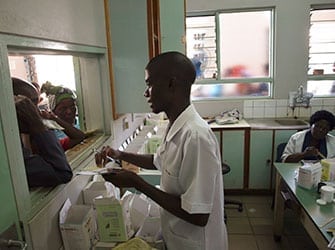New Pharmacy Assistants Graduate, Improving Patient Care at Critically Understaffed Rural Health Centers

When most of us think of our local pharmacy, we take certain things for granted. We expect that the medications prescribed to us will be in stock and that the well-educated pharmacist staff will give us clear instructions on how to take them, along with any appropriate warnings or side effects of which we need to be aware.
In other parts of the world, those basic assumptions are not the norm. In remote villages, it can be difficult to ensure essential medications are kept in stock and re-supplied as needed. Often there aren’t dedicated, trained pharmacy personnel, nor bottles and labels to dispense medications; pills, if they are in stock, might be wrapped in newspaper or plastic bags with little or no verbal instructions given.
Malawi College of Health Sciences, VillageReach, University of Washington and the Malawi Ministry of Health Collaborate
An innovative Pharmacist Assistant training program in Malawi seeks to change that norm. On June 19, 2015 in Lilongwe, Malawi, the first cohort of students graduated the program—the result of a collaboration between the Malawi Ministry of Health, the U.S. Government through the USAID | Deliver Project, the Malawi College of Health Sciences, University of Washington Global Medicines Program, and Seattle-based NGO VillageReach.

The program produces a dedicated cadre of individuals with enhanced training in medicines management and supply chain practices who will eventually support each of Malawi’s 650 rural health centers. Through this new program, students are trained to dispense life-saving medications and provide patients with essential advice, and also gain the skills to effectively manage inventory to ensure a well-functioning supply chain.
“The Pharmacy Assistants will go a long way to improve the quality of health service delivery in rural areas, as well as strengthening health systems in the country through improved medicines information management that the government can rely on and use to serve people better,” says Albert Khuwi, Health Technical Support Services Deputy Director for the Malawi Ministry of Health.
Visionary Approach to Address Pharmacy Worker Shortages
During the two-year program, students complete two five-month practicums in district hospitals and rural health centers, in addition to the classroom-based learning. The emphasis in practical experience allows students to make an almost immediate impact in rural pharmacies where overburdened and undertrained personnel struggle to meet the demands placed on them. Initial results showed an 80% reduction in clinician time spent on logistics in health facilities with Pharmacy Assistant students, allowing health workers to devote more time to patient care.
Additionally, when a Pharmacy Assistant is working in a health center, the following measures may improve:
- the quality of patient pharmaceutical care;
- adherence to proper dispensing practices and drug management standards; and
- the quality of data reported to higher levels in the supply chain.

“This visionary program addresses one of the most critical issues facing many countries—shortages of qualified pharmacy workers. This partnership allows us to create a program that benefits people’s daily lives and well-being,” commented Andy Stergachis, Professor and Associate Dean of the UW School of Pharmacy.
The program launched in 2011 with funding support from the Barr Foundation, the USAID | DELIVER PROJECT, and Vitol Foundation. The current program will graduate two more cohorts, placing an additional 148 Pharmacy Assistants at rural health centers by 2017. The Malawi Ministry of Health has expressed the desire to place as many as 650 Pharmacy Assistants to meet the needs of its rural communities.
“The U.S. Government is proud of this successful partnership with the Government of Malawi, VillageReach, The Malawi College of Health Sciences, and the University of Washington, and very proud of the 20 USAID-sponsored students who graduated today. We are confident that these new Pharmacy Assistants will contribute greatly to the improvement of Malawi’s health sector,” noted USAID/Malawi’s Deputy Health Office Director Lilly Banda.
After graduation, the students will become employees of the Malawi Ministry of Health, which will place them for work in rural health centers throughout the country.
***
About VillageReach VillageReach is a non-profit global health innovator that develops, tests, implements and scales new solutions to critical health system challenges in low-resource environments, with an emphasis on strengthening the “last mile” of healthcare delivery. VillageReach combines expertise across public health, technology, and business to bring life-saving innovation – new systems, programs and technologies – to scale and sustainability in the world’s most underserved communities. www.villagereach.org
About Malawi College of Health Sciences Malawi College of Health Sciences provides education and training of the highest quality to a range of middle level health personnel essential to promote health and improve services through provision of quality training, consultancies and research.
About the University of Washington, School of Pharmacy, and Global Medicines Program Founded in 1861, the UW ranks 3rd in the world for Clinical Medicine and Pharmacy in the 2014 Academic Ranking of World Universities. The University leads the nation’s public research universities in receipt of federal support for research and training. The UW School of Pharmacy is committed to educating the next generation of leaders in pharmacy, pharmaceutical research, and health care—while seeking to ensure the safe, rational, and cost-effective use of medicines. The Global Medicines Program in the Department of Global Health works to improve the use, safety, quality, cost-effectiveness, and affordability of medicines in low- and middle-income countries through research, education, training and outreach. Visit http://globalmedicines.org, https://sop.washington.edu for more information.